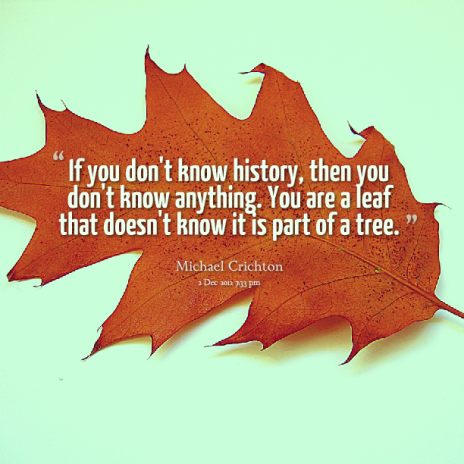Incidentally, in a conversation just a little while ago I had to explore some history to try to reach some clear understanding of a cultural matter. The culture of people are a practical demonstration of their identity. A loss of their cultural history often results in the kind of vulnerability that we witness in Africa today: a vulnerability that shows itself in our embarrassing efforts to acquire and display foreign accents, in our dash to buy all things Western, in our speed to bad-mouth Nigerian ways and things. It is easy to sell any narrative about Nigeria to Nigerians today especially because we have no idea what we once were and where we once headed. We are like sheep without shepherd without our history.
In a personal experience I saw another side to this issue. History may not be lost but it may be so painful that you wish that it was. Every time you come up against it you want to avert your eyes and pray that by the time you look up it would have dissolved like mist before the rising sun. And yet without facing that history squarely and bravely but intelligently dissecting it, that fear that it always inspires will be the baggage you carry everywhere with you.
My secondary school and university days carry their share of history. I can often hold my own when embarrassment comes at me in public. I don’t know where I picked up the skill but I actually know how to take an embarrassing moment and make it a memorable one. Or at least I used to. But memories are a whole other bucket of fish. Sometimes you remember and shudder at what you did and hope nobody else does. History may be embarrassing.
How we understand the past is the most important element determining the future — James Carrol
But without history, how can we know our own selves and plot a course for the future? What you do not face squarely and clearly sort through is likely to haunt you into repeating the same mistakes. History says a lot about who we are. As a matter of fact, without it, we are ships adrift on the sea. We need it to guide our paths into the future.
The question “who am I?” begins its answer in “what came before?” History may be scary; it may be embarrassing or it may be unknown but it should never be ignored. Discovering it is key to discovering ourselves, understanding it is key to understanding the decisions we have to make and the paths open to us. Owning it takes the power of definition away from possibly malevolent or dubious elements and gives it back to us.
……………………………………….
Odii is an entrepreneur. Figuring life out and sharing his discoveries is business he enjoys doing. You can find him @ Panorama


This is something that most Nigerians fail to realize. As funny as it may sound, few people m, if not most can put in words history of past American history makers but have little or no idea about ours.
This re-directs us to the drawing board. As you did put, history says a lot about who we are. and without it, we are ships adrift on the sea. We need it to guide our paths into the future. Hope we really do.
much love, George
LikeLiked by 1 person
Hi George, like you’ve rightly said, Nigeria needs to get back to the drawing board rather than feed her mind with history of other countries. It will help us get anchored long enough to rebuild.
Thanks 🙂
LikeLiked by 1 person
Yesterday, one of the trending hashtags on twitter was meme history and trust Nigerians to join the bandwagon with all enthusiasm. Sadly most of the tweet from Nigeria were about biblical history, it was almost heartbreaking to see that while the rest of the world could tweet about their history with full assurance, we couldn’t.
I enjoyed reading this post and I think all the points you raised are very valid. Good job on writing this Odii.
LikeLiked by 2 people
Thank you, Adaeze, for your kind words. I didn’t see the Twitter thing but I’m not surprised. We are a people who have been devastated intellectually so it is not hard to imagine that such a thing would have happened. I miss the days when we talked about Gandoki, Aminu Kano, Jaja of Opobo, Zik of Africa and Usman dan Fodio. These names would probably leave too many mouths gaping and eyes glazed if you mentioned them now. It’s a tragedy but if we could recapture what happened during the lifetimes of these men and women perhaps the constant mantra about Africa rising would actually become a reality.
Thank you for reading and sharing your thoughts, Adaeze. 🙂
LikeLiked by 2 people
It’s either history is lost on us (school curriculum) or we’re trying to run away from it.
Either way, it’s a sad situation.
LikeLiked by 1 person
Trying to severe the ties between history and e future is almost as equal as trying to separate a conjoin twins without surgery – its a futile exercise. Agreed with your dissection of the whole scenario.
Whether as a country or as an individual, the past is a ruthless teacher that we must actively subject ourselves to in order to maximise the lessons
LikeLike
You’re exactly right, Dream, especially about the part that the past is a ruthless teacher. It certainly cares nothing for how you might feel about your lessons. And your metaphors made me smile. 🙂 Thank you for being here, Dream.
LikeLiked by 1 person
😀😀😀. You are welcome.
So I wrote a metaphor? My alma mata English teacher need to read this , lol. That’s just how I roll, don’t mind me
I won’t mind being called Immanuel if ‘D’Dream is too long
LikeLike
Oh yes you did. I’m sure she’ll (bet she’s a she, hehe) be proud. Sure, Immanuel is “shorter”. 😀 It’s good to meet you.
LikeLike
The pleasure is mine.
plus you write a good yard for a husband material 😀. Oh i wrote a metaphor? Seriously? My alma mata English will be proud of me wherever she is.
**** I don’t mind Immanuel , I think D’Dream can be confusing a times
LikeLiked by 1 person
Lol. Bro, you’re good. “A good yard for husband material”. That’s very funny and refreshing. Thank you jare. Now, I’ll go tell the girls you said that. Maybe I’ll finally get me a girlfriend, lmao.
Immanuel, obviously, I’m Odii. Nearly everyone on speaking terms with me calls me that. 🙂
LikeLike
“the past is a ruthless teacher that we must actively subject ourselves to in order to maximise the lessons”
Well written, Immanuel. If we cannot take advantage of the lessons our past provide, we could end up making the same mistakes again.
Thank you for reading 🙂 And yeah, very good metaphor.
LikeLiked by 1 person
‘…What you do not face squarely and clearly sort through is likely to haunt you into repeating the same mistakes.’ Absolutely true.
Even if u do not repeat the same mistakes, you won’t make sustainable headway until you’ve fully dealt with your past.
Nice post & Very well written.
LikeLiked by 1 person
Thank you, Olisa. I’m glad that you found it good reading. And you’re right, even when you do not repeat the same mistakes, it is hard to make good headway if you do not address your past properly.
LikeLike
Hi Olisa 🙂
You’re correct; the past when not addressed can be a shadow tailing you everywhere you go. It’s too much weight to carry about even when you hardly pay attention to it, and can leave one living in potential fear of reliving history.
LikeLike
Nice post, uju. You’re right, for individuals and nations, it’s sometimes difficult to accept it even acknowledge the last and the part we played in it. This country has had its share of embarrassments that we continue to struggle with because people can’t accept their roles in what took place or place the past in the past in order to move on. Instead we decide to dwell in the past and as a result, we have difficulty changing or moving into the future.
LikeLiked by 1 person
Thank you, George, for reading. You’re right. An unresolved past will do that to a people. Now you hear that they’ve taken history out of our curriculum too. It is as if we have leaders who want us to continue to be blind-sided by enemies we have encountered before. We need to do a proper study of our history so that we can move on from it and build a future worth having. Until we can do that, we’ll keep wandering around the same old issues.
LikeLiked by 1 person
Hi George. I think another problem people and nations could be facing is overcompensating for the past.
So we get that slaves were carted from Africa and sold to the West. We also get that in South Africa apartheid was a big issue. In Nigeria we’re still stuck dealing/pretending to deal with our civil war from many years ago.
These pieces of history should help us move ahead like you’ve rightly said. Unfortunately most of what I see today is that we spend so much time trying to ‘right’ the wrong. How much of a wrong can actually be corrected now?
The danger I see in this is rather than using the past as a tool to shape the future, we carry it with us into the future. Most of this can be seen in the sense of entitlement the ‘minorities’ develop over time; the preferential treatment availed them too; and the growing sense of resentment from the ‘majorities’.
In effect we eventually realize nothing has changed. Rather than get better, we only succeed in creating another dimension of our past.
LikeLiked by 1 person
You’re absolutely right, uju. There is a delicate balance here. We don’t want to forget the past because we hope the lessons learned from those mistakes are not repeated in the future but we don’t want to live in the past either. Having never been subjected to the types of discrimination some have endured, and continue to be subjected to, it’s hard for me to be that voice that says how people should or shouldn’t act. I just feel that in order to move forward we have to teach and set examples that don’t include our anger. Children will learn what we teach and if we only teach one thing, we will never make this world a better place.
LikeLiked by 1 person
Hey beautiful! I realize this is a problem for most descendents of Aftica; we don’t know our true history. And we avert our eyes to it, because it may lead us to pain we are not ready to experience.
LikeLiked by 1 person
Hi Rose. Thank you for reading. You’re right. The pain and embarrassment of our history might prevent us from looking at it. For instance, here in Nigeria, the pain of the Civil War often has people refusing to examine it critically to understand the factors that contributed to the event and what we could do to mitigate those factors and build a stronger nation than we once had. Instead we throw around sometimes-unfounded sentiments that only drive the rifts between us and now the government has made a classical move to delete the event and leave an unexplained animosity between constituent elements of the country leaving us vulnerable to massive exploitations in the future.
LikeLiked by 2 people
You are correct in all you say. Hopefully we can take efforts to make an impact! Great post and keep speaking the truth.
LikeLike
Thank you, Rose. 🙂
LikeLike